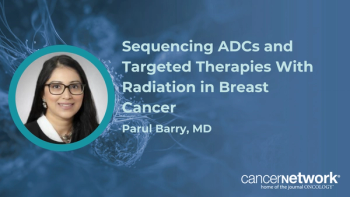
- ONCOLOGY Vol 10 No 4
- Volume 10
- Issue 4
Regular NSAID Use Appears to Reduce Breast Cancer Severity
The anticancer benefits of nonsteroidal anti-inflammatory drugs (NSAIDs), seen in studies of colon cancer risk, may extend to human breast cancer as well.
The anticancer benefits of nonsteroidal anti-inflammatory drugs(NSAIDs), seen in studies of colon cancer risk, may extend tohuman breast cancer as well. A study of NSAID use in breast cancerpatients at the Moffitt Cancer Center, Tampa, Fla, showed thatwomen who used the drugs regularly had smaller tumors and wereless likely to have lymph node involvement.
"At this point, any recommendations would be premature, butchemopreventive use of these drugs probably would not be so inappropriateand might represent a logical step, at least on the basis of thesefindings," David V. Schapira, MD, said in an interview atthe San Antonio Breast Cancer Symposium.
Interest in the chemopreventive potential of NSAIDs stems fromevidence that prostaglandin-E (PGE) plays a role in cyclic AMP-regulatedcell proliferation and that some patients with malignancies haveelevated PGE levels. By inhibiting PGE synthesis or activity,NSAIDs conceivably could have a favorable effect on cancer riskor prognosis.
Dr. Schapira noted that several NSAIDs have been shown to inhibitthe growth of breast and colon tumors induced in rodents. Thesestudies also demonstrate that indomethacin inhibits bone metastasisin laboratory animals injected with mouse mammary tumor cells.
At the San Antonio symposium, Dr. Schapira reported data on NSAIDuse in 341 consecutive newly diagnosed breast cancer patients.The data were then correlated with tumor size, lymph node involvement,estrogen/progesterone receptor status, DNA ploidy, and S-phasefraction.
The analysis showed significant associations between the numberof NSAID pills and two prognostic factors: tumor size and lymphnode involvement (see Table on page 544). Almost 60% of the womenwho took 10 or more pills monthly had tumors smaller than 2 cm.In contrast, about 60% of women who reported no NSAID ingestionhad tumors that were 2 cm or larger.
A similar association occurred with respect to node involvement:63% of women in the 10-pill category had negative nodes and 60%in the zero-pill group had positive nodes.
"These results are compatible with the earlier findings onthe effect of NSAIDs on the growth and metastatic potential ofbreast cancer," said Dr. Schapira, currently director ofthe Stanley S. Scott Cancer Center at the Louisiana State UniversityMedical Center, New Orleans. "The findings suggest that NSAIDsmay favorably affect the prognosis of breast cancer and, additionally,that the drugs may have a role in breast cancer chemoprevention."
Different NSAIDs may differ in their ability to inhibit prostaglandinsynthesis, but the investigators did not evaluate that issue.About 75% to 80% of the patients in the study named ibuprofenas their NSAID of choice.
"The data on colon cancer prevention and regular NSAID useare quite positive," Dr. Schapira said. "The next logicalstep would be to do a randomized, prospective study to see ifthese drugs can prevent breast cancer."
Articles in this issue
almost 30 years ago
Radiosurgery Plus Sensitizer Tested for Brain Tumorsalmost 30 years ago
New Sequential Dosing Regimen Shows Promise in Node-Positive Breast Canceralmost 30 years ago
Deaths from Melanoma--United States, 1973-1992almost 30 years ago
Survivors of Childhood Cancer Face Other Medical Risks As Adultsalmost 30 years ago
Post-Transplantation Complications of Unrelated Bone Marrowalmost 30 years ago
Intensified VICE Regimen May Improve SCLC SurvivalNewsletter
Stay up to date on recent advances in the multidisciplinary approach to cancer.





































